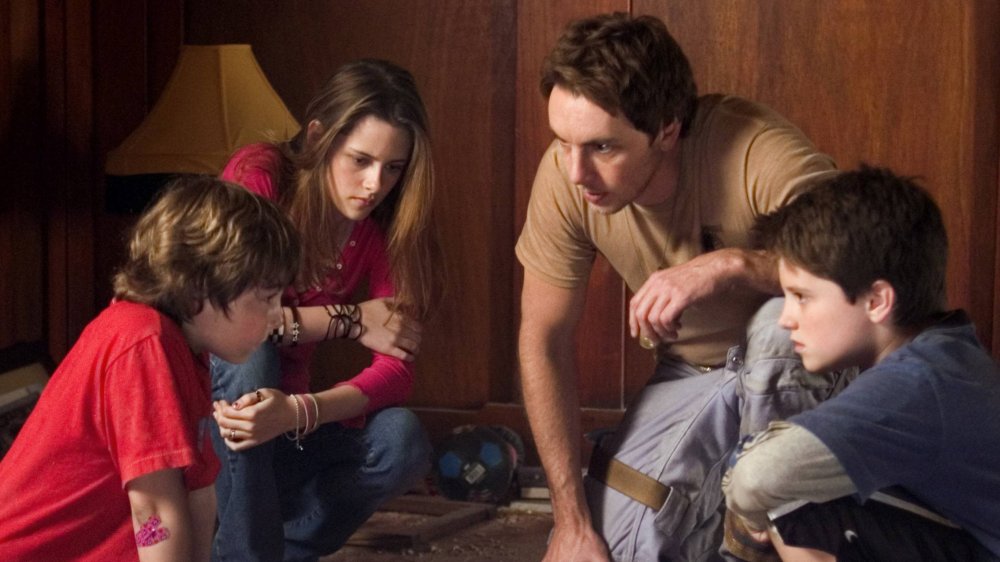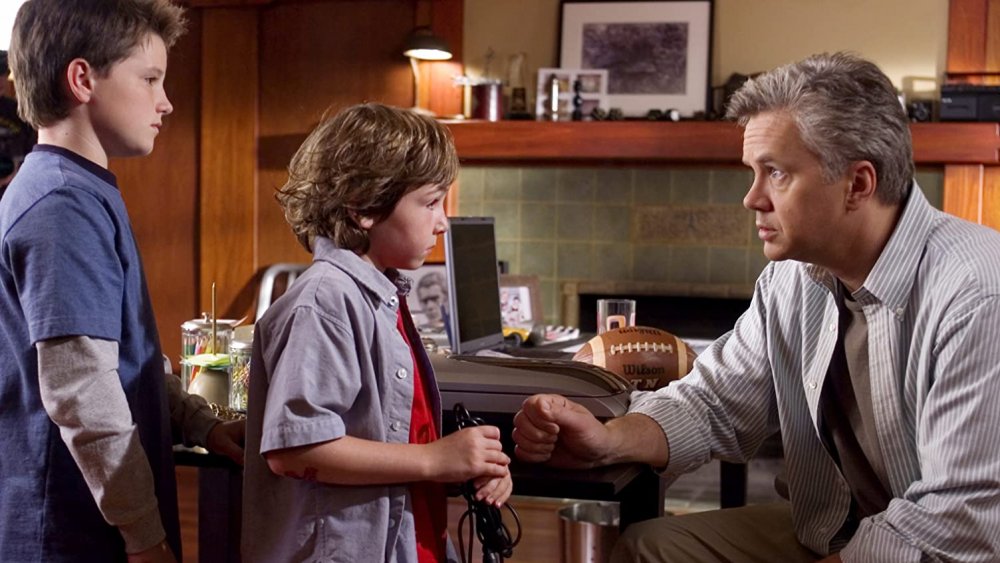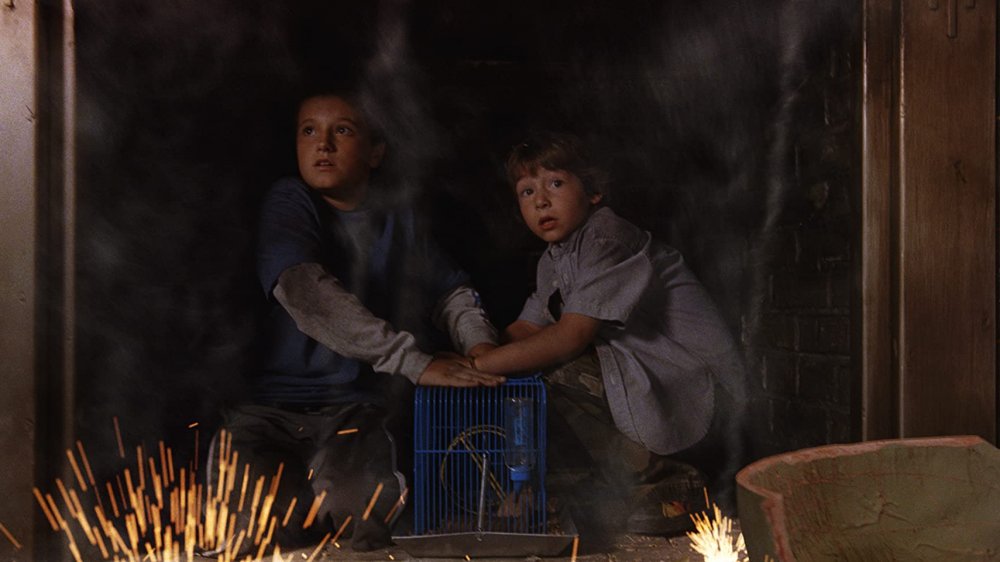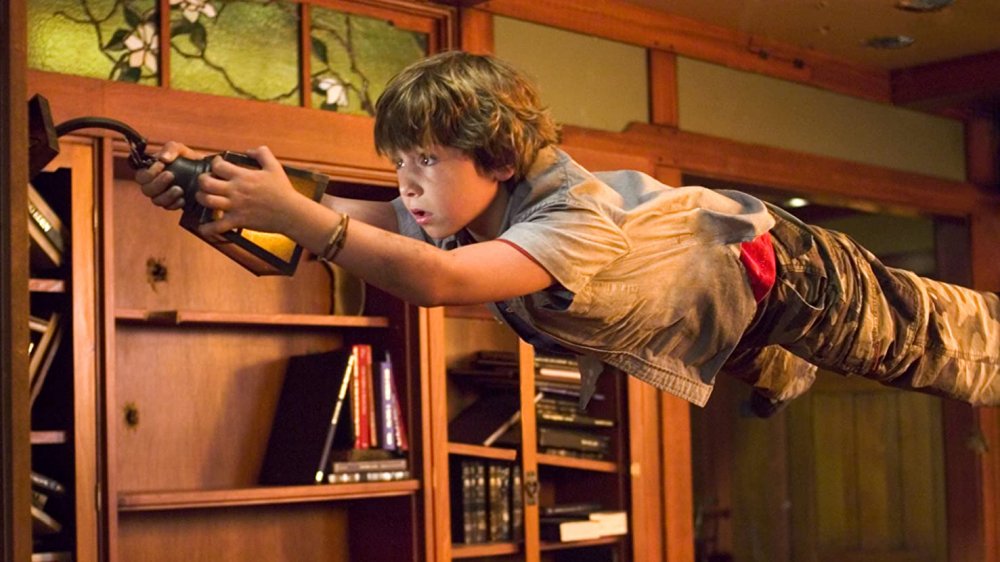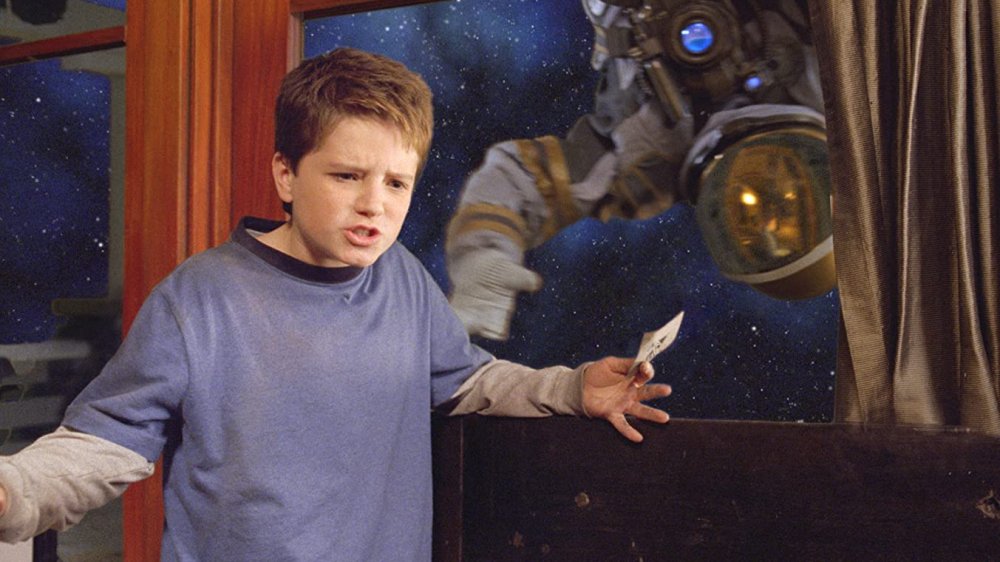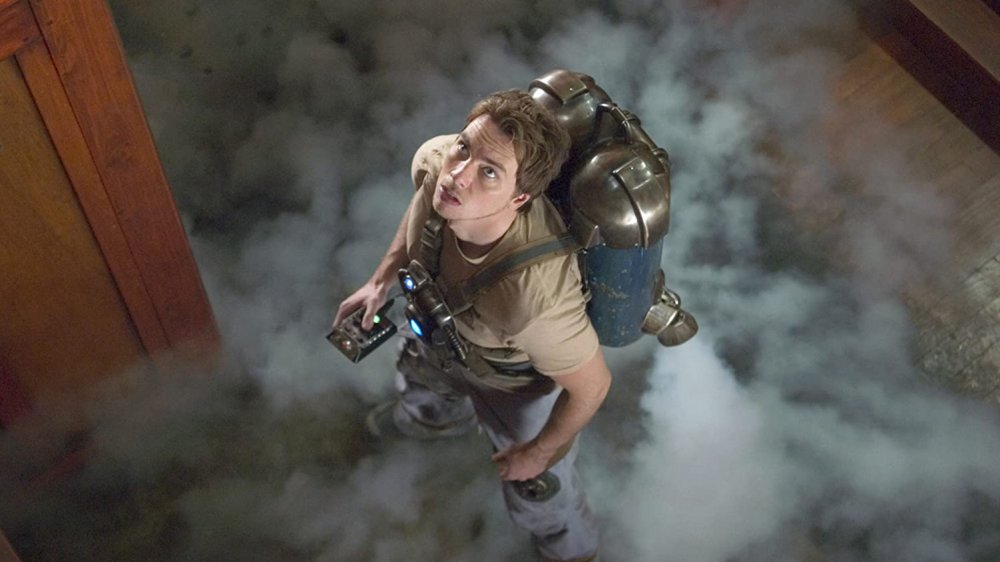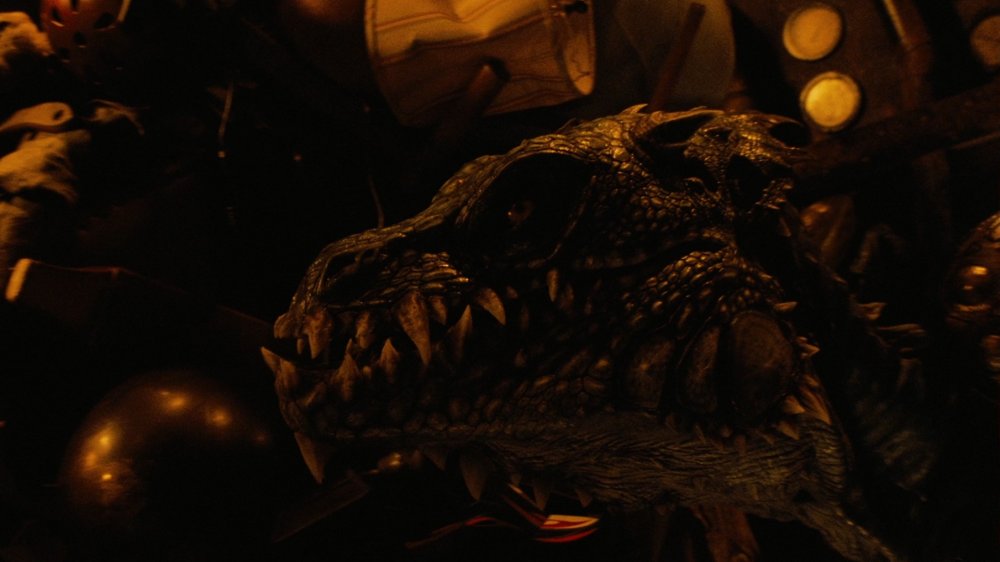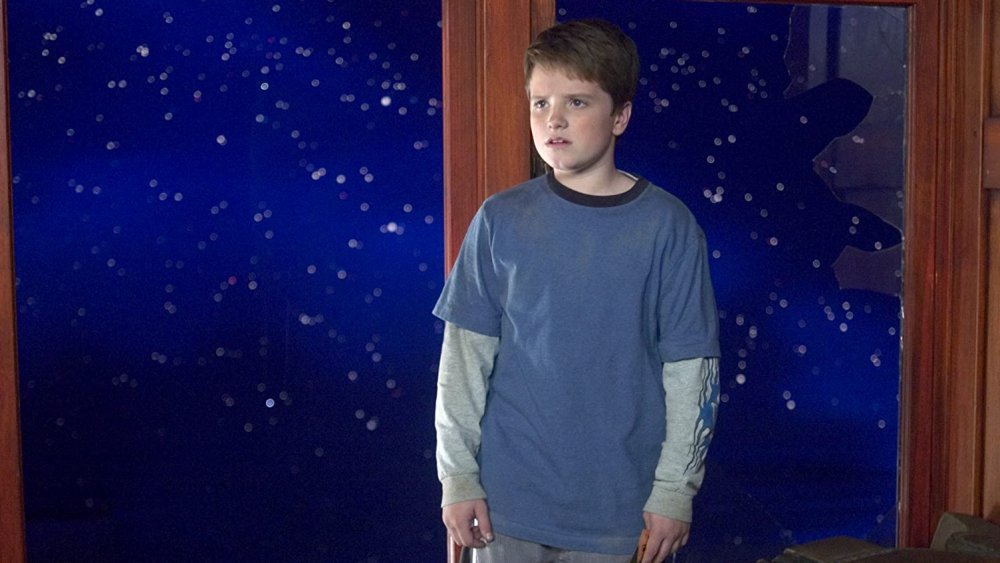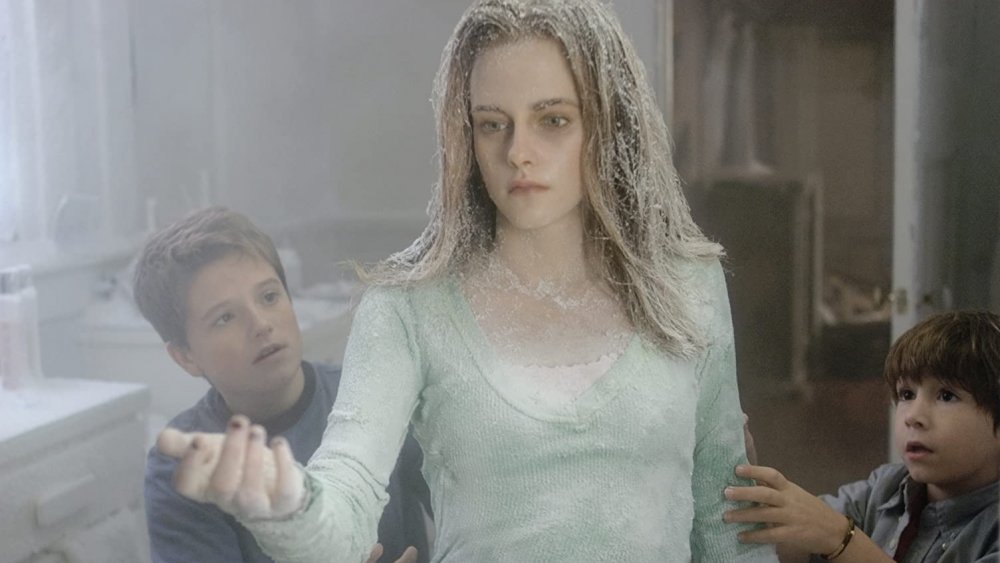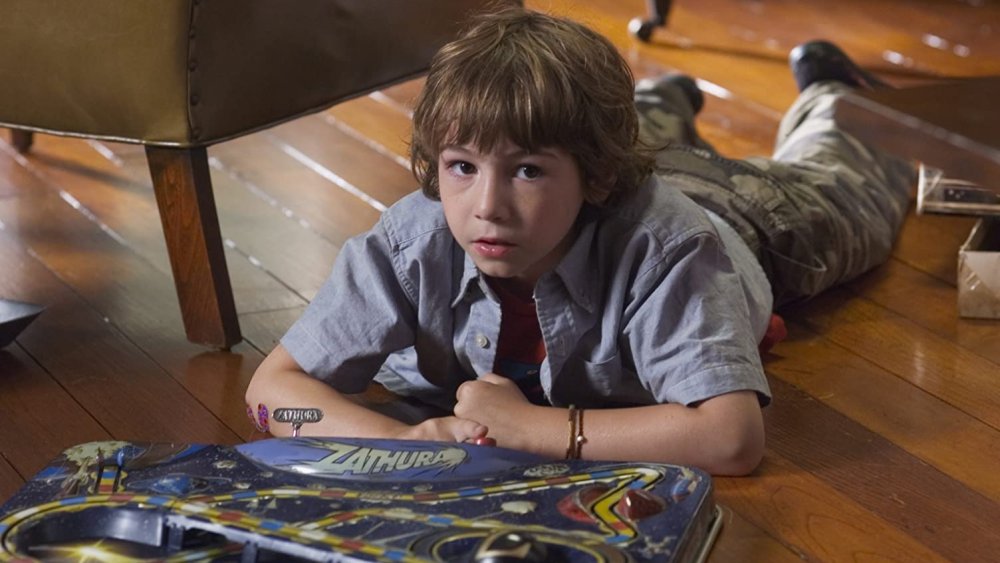Things Only Adults Notice In Zathura
In 1995, a fantasy adventure called Jumanji hit theaters. Not only was it a hit, but it also became a staple of '90s kids' pop culture diets to such a degree that it ultimately spawned a sequel franchise that launched with Jumanji: Welcome to the Jungle in 2017. It's a classic of its era and an unforgettable film for an entire generation, but it's not the only magic board game movie out there.
Ten years after Jumanji, we were introduced to Zathura, another magical game adventure film that was an unrelated spinoff of the '95 jungle classic, inspired by a different children's novel written by the same author, Chris Van Allsburg. Unlike Jumanji, Zathura opted to take a sci-fi approach, catapulting its players into deep space for a struggle against meteors, aliens, and one very cranky astronaut. Though the film received critical acclaim upon release, it wasn't the cultural touchstone that its predecessor turned out to be.
And that's a shame because revisiting Zathura reveals that it actually holds up very well as a family adventure movie that both kids and adults can watch together. And, as with most films like that, the adults are sometimes going to pick up on things that the kids just don't see. These are the things only adults notice in Zathura.
There's plenty of family drama in Zathura
Zathura begins by introducing us to the somewhat compromised dynamic at work in the Budwing family, as older brother Walter (Josh Hutcherson) and younger brother Danny (Jonah Bobo) bicker over who gets more time with their dad (Tim Robbins), who gets control of the TV, and more. In the process of introducing us to the family, the film makes it clear that this environment — the kids staying with their father even as he's trying to go through an important work day — is the product of divorce.
We know this because the film tells us through the various arguments that Walter gets into with both his brother and his father. At one point, when he learns that they're about to be moved to his mother's house, Walter gets angry, wishing he could stay at his father's instead. A few minutes later, though, when both Walter and Danny point out that their father's house is "creepy," Walter seems to acknowledge that his mother's house is just a better place to hang out. And then, of course, there are the frequent moments throughout the film in which an angry Walter calls Danny the reason for all of their problems, claiming that everything was fine before he was born.
Unless the kids watching have been through it themselves, they might not really understand the level of emotional confusion Walter's going through. This is a kid who provokes conflict because, deep down, he still doesn't fully understand why his whole life had to change, and he wants someone to blame.
Where are the other grown-ups?
The opening minutes of Zathura are all about setting things up for the story so that Walter and Danny can be alone, without major interference from adults, to play the game and embark on their space adventure. With that in mind, their father is very quickly hustled out the door to go to an important meeting, and in lieu of calling another adult to watch his sons, he instead wakes up his teenage daughter, Lisa (Kristen Stewart). Even if Lisa showed an interest in watching her little brothers, which she doesn't, she ends up cryogenically frozen for most of the movie, and therefore, she's unable to help.
And yet, adults in the room might notice a detail that points to at least one other adult who might have been in the picture. In the scene in which the Astronaut (Dax Shepard) starts eating all the food in the fridge, Danny points out that "Lupe just went shopping," and so they should have enough food. Who is Lupe? The implication is that she's a housekeeper, but she could also be a relative or even the father's romantic partner. So, if the father can afford a housekeeper so thorough that she does the shopping, why can't he also get a babysitter? And if it's a romantic partner or relative who's that involved in the household, why can't she be called at that moment? Lupe could've stopped all of this before it started.
Adults will notice something is up with the space physics
Like Jumanji, Zathura is the story of a magic board game that physically affects the world around its players. Unlike Jumanji, which brought elements of a jungle setting to our world, Zathura literally takes the players and the whole house they're living in to space, creating a whole new set of rules for how things might work in terms of danger.
On some level, because of the nature of the film, it's easy to just let this new circumstance go without questioning the logic of it too much, and the film even pokes fun at itself at one point when Walter insists that the plumbing won't work even as Danny fills a pot of water to make macaroni and cheese. While kids are invested in the magic of it, though, the adults in the room are probably noticing that not all Zathura threats are created equal.
For one thing, the house seems to maintain its own gravity field despite being teleported into outer space. For another, whole walls can be ripped off of the structure without dragging the occupants out into the void, and yet when they pass by a sun, the gravity field is enough to nearly kill them. It's all in service to the story, of course, but Walter and Danny are very lucky that their house only responds to some aspects of danger in space.
How did the Astronaut survive out there?
Eventually, after surviving a number of other threats, Walter and Danny meet the Astronaut, a stranded spaceman who's drawn to the house when the game gives them a card saying they're supposed to rescue him. As we spend more time with the Astronaut, we learn more about his backstory. He was playing the game with his brother, made a wish on a shooting star that his brother was never born, and was therefore stranded without any way to get home because the other player, his brother, could never take their turn with the game.
In the course of explaining his life since then, the Astronaut mentions that he's been eating "paste" from a tube for years, and he's managed to gain quite a bit of know-how about how to survive out in deep space. What he doesn't mention is how he managed to survive those initial days, weeks, and months, particularly since he was a little boy at the time. Was he rescued by other space explorers? Where are they? How did he end up with a spacesuit? Did the game provide those things and allow him to improvise? Whatever happened, he'd apparently be very good in some kind of Man vs. Wild-in-space situation.
Zathura should've looked deeper into the Astronaut's story
For much of his time in Zathura, the Astronaut remains a relatively mysterious figure, in part because the film needs to preserve his identity for the big twist that lets us know who he really is and how he ended up here. That layer of mystery means that there are huge chunks of his history, including what he's been doing to keep busy for the past 15 years, that are never fully addressed.
For example, while kids might not notice or at least might not make the connection, parents in the audience probably saw that the Astronaut is wearing dog tags, a common sign of military service. So ... where did he serve? Did he have adventures in the space military on some distant planet? He mentions going through a time sphincter, so did he use another one of those to go to another era of Earth and serve in the U.S. military somewhere? Did he just find them and think they were cool? Whatever happened, it paints a fascinating picture of the Astronaut's life that the film just doesn't have enough to dig deeper into.
There's an issue with those aliens
Walter and Danny face a number of space threats during their time playing Zathura, from a meteor shower to a malfunctioning robot to the gravity well of a sun, but by far the most dangerous of these threats turns out to be the Zorgons. The Zorgons are a race of alien scavengers who show up and seem ready to rip the house to shreds until the Astronaut drives them away with the help of a burning couch.
See, as the Astronaut explains, the Zorgons are cold-blooded lizard creatures who scavenge the galaxy for any kind of heat. They're drawn to things like lights and appliances and heating elements, so to get rid of them, Walter and Danny must turn off every light and extinguish every flame in the house, even the tiniest pilot light. For kids, this makes perfect sense, but the adults in the room might have questions. After all, the Astronaut insists that every heat source has to be turned off, but he never mentions body heat. If a pilot light on a furnace in the basement can draw these things, why can't several living, breathing humans clustered together in a high-stress situation? Maybe the Zorgons just need better detection equipment.
Time-travel trouble
When we first meet the Astronaut, he's portrayed as a mysterious figure from space who just happens to be summoned into the house due to the game dealing the right card to Walter and Danny. Eventually, though, the reason he knows so much about the game and about them becomes clear: He's actually a future version of Walter, 15 years older, who got stranded in space after he wished on a star that Danny had never been born.
The Astronaut only reveals this to the boys after Walter gets a second wish card, and wishes that the Astronaut could have his brother back. This produces a doppelganger of Danny, the truth comes out, and both the Astronaut and the other Danny fade away as the timelines are reconciled.
It's a sweet moment, but the adults in the room might've noticed something interesting about it. By talking Walter out of using his first wish to wish Danny away, the Astronaut actually prevented his own sad future from happening at all. There was no need for a second wish to bring Danny back because Danny never left. Therefore, if this is a film that posits that the alternate future is simply erased, it should've probably been erased the moment young Walter decided he wanted Danny to stay. Time travel just tends to make things a little loopy that way.
What happened to Lisa?
Zathura is, despite the other characters moving in and out of the narrative, the story of two brothers who are caught up in an adventure together. Walter and Danny begin the movie at odds with one another, get caught up in playing the game, and have to learn to work together to get back home safely. They do this with the help of the Astronaut, who ultimately reveals himself to be the product of a darker timeline, one in which Walter and Danny failed to work together and Walter wished Danny away in anger.
The ultimate message of the movie — that family is about love and cooperation, even amid adversity — is still quite clear, but the adults watching the film may have noticed something else. Walter and Danny are playing the game, but their older sister, Lisa, is also stranded in space with them, and she eventually even wakes up from cryogenic stasis to help them survive. The Astronaut ultimately reveals himself to be future Walter, who got stranded when Danny was wished away, but if that's true then ... what happened to Lisa in the Astronaut's timeline? It's possible the game didn't let her take Danny's place after he vanished, but even if that's true, she should've also been alive in the house, right? Did she die? Did she get taken by aliens? There's a dark extra layer to the Astronaut's story that the film never takes time to address.
Zathura knows all
Zathura is a successful film experience in part because it delivers exactly what its trailers promised — a fun, family-friendly space adventure that features several elaborate sci-fi set pieces bound to please kids and adults alike. What really puts the film over the top, though, is the way it works as a story about family, destiny, and love.
When Walter and Danny draw the astronaut card while playing the game, they expect just another random sci-fi encounter, and when the Astronaut shows up, he at first presents in exactly that way. As the film goes on, though, we find out that he's actually an adult Walter from the future, and he's come back to convince his younger self not to destroy his family out of spite.
This is particularly interesting because every other encounter in the game is still random, which implies there was a reason for that card at that moment. It seems that Zathura itself, whether out of a desire to finish the game or some self-aware sense of love, sent Walter back to fix his mistake and repair his family.
